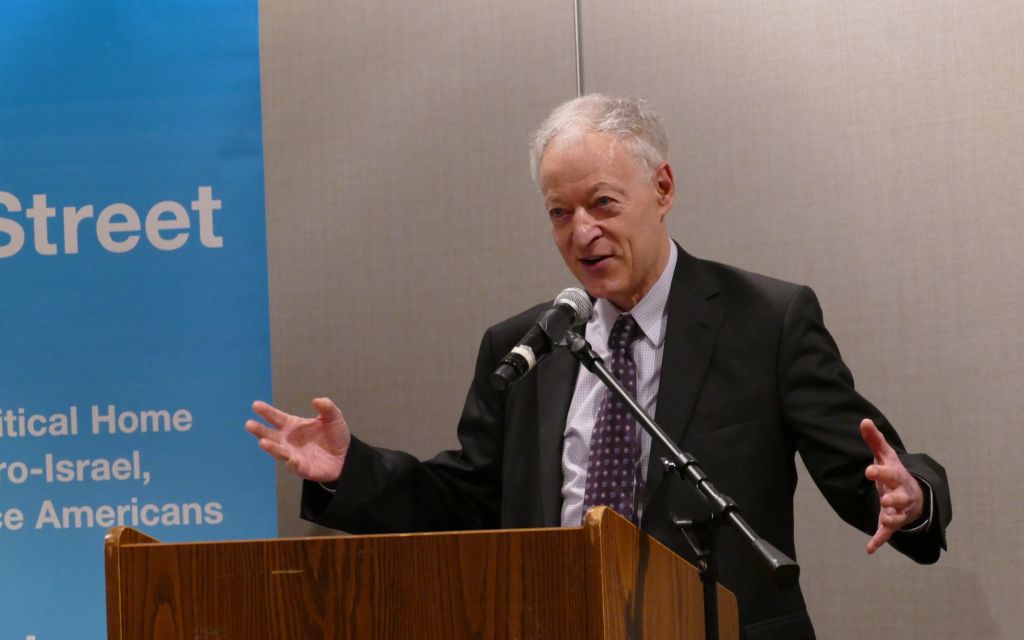For Israel Backers, Agreeing on Ends Is Good Start
J Street and AIPAC say they want the same things, so why is there so much anger between them?
The fifth J Street presentation at Temple Sinai in six years turned into an exploration of what it means to be pro-Israel and pro-peace, the two labels the lobby group uses to distinguish itself from the larger AIPAC.
Despite a lack of publicity, at least 60 people turned out Wednesday, March 7, to hear Alan Elsner, who holds the title of special adviser to J Street President Jeremy Ben-Ami.
Elsner, a native of England and longtime Reuters reporter, laid out his pro-Israel bona fides. He shared the thrills of Israel’s military victory as the son of a Holocaust survivor in 1967, rushed to Israel to volunteer on a kibbutz during the Yom Kippur War in 1973, did his Israel Defense Forces basic training on the West Bank in 1977, and was already 40 miles into Lebanon with the 1982 invasion force as Prime Minister Menachem Begin was saying Israel would go only 25 miles.
Get The AJT Newsletter by email and never miss our top stories Free Sign Up
He has family in Israel, and there’s no reason to doubt he’s a Zionist who believes that Israel must end the occupation and separate from the Palestinians to remain Jewish and democratic.
Of course, Elsner was echoing what AIPAC CEO Howard Kohr said three days earlier at the AIPAC Policy Conference in Washington: “We must all work toward that future: two states for two peoples … one Jewish with secure and defensible borders, and one Palestinian with its own flag and its own future. Today that dream seems remote. This is tragic.”
So if J Street and AIPAC share the two-state goal, which means they share the desire to end the occupation, what’s the difference? Elsner even said the Palestinians have no leader with whom to make peace and instead are led by a kleptocrat in the 14th year of a four-year term as president.
What divides AIPAC and J Street, as in the case of any two groups of Jews who seem willing to debate themselves to death, is a matter of priorities.
One side acknowledges Benjamin Netanyahu’s faults but obsesses over Mahmoud Abbas. The other acknowledges Abbas’ faults but obsesses over Netanyahu. One side sees the West Bank and Gaza as a terrorist threat that must be neutralized to save Jews. The other side looks at the same areas and sees enforced suffering that violates Jewish values.
One side hopes a two-state solution will stop vehicles ramming into pedestrians. The other side hopes a two-state solution will end a callous, violent approach of security forces toward fellow Israelis.
Each side knows that the concerns of the other are legitimate, but it downplays them while feeling outrage. People on the AIPAC side get offended that J Street calls itself pro-peace, implying that AIPAC and others are anti-peace, then J Street backers get offended when AIPAC supporters lash out in response.
And because the true lines are more anti-J Street and anti-AIPAC than anything else, insults fly.
I’m not part of either group, though I have my doubts about whether J Street is a pro-Israel group that skews Democratic or a pro-Democratic group trying to make Israel supporters comfortable. It’s telling that J Street is endorsing more than 140 congressional candidates this year without finding one Republican who is “pro-peace and pro-Israel,” just as it was telling that J Street couldn’t wait for the Iran nuclear deal to be done before launching a PR campaign in its favor.
But I’m disappointed that people were offended even to see J Street at Temple Sinai. We’re too small a community — locally, nationally and internationally — to assume the worst of one another. Fellow Jews who say they’re pro-Israel almost certainly are, even if they differ on how to show that support. Fellow Jews who say they’re pro-peace almost certainly are, even if they disagree on how to maintain that peace.
At the same time, we must have faith in fellow Jews’ ability to sort through arguments and evidence. We can’t be afraid that groups we disagree with will fool enough people to hurt Israel. It’s better to counter arguments than to silence them.





comments